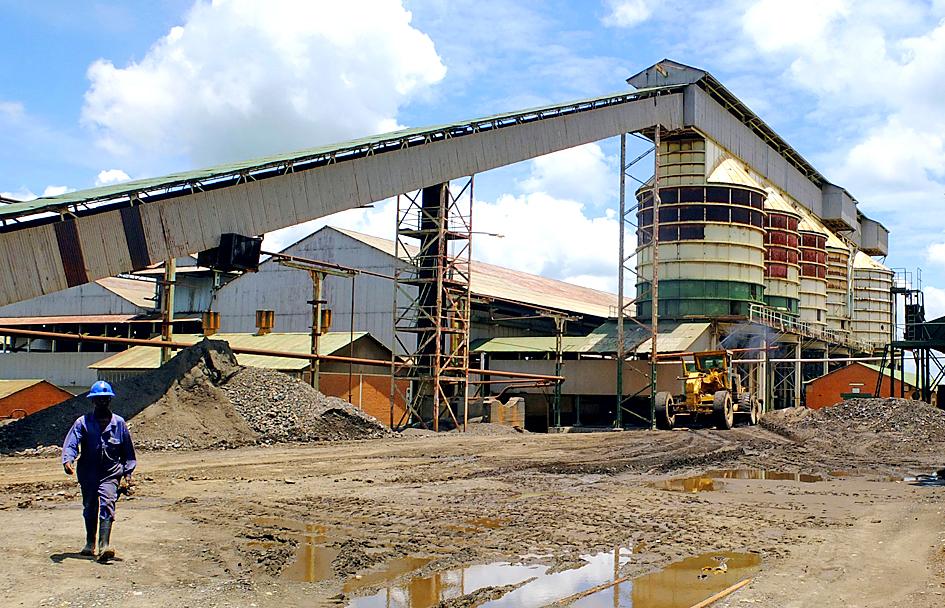Copper prices advanced as supply concerns mounted with the giant mines of South America sending mixed signals on the outlook for production.
In Chile, the biggest copper-producing nation, unions called for a two-week shutdown at the Chuquicamata mine after the death of a second worker.
In Peru, the second-largest producer, the industry is nearing full output again after halting for two months when the COVID-19 pandemic hit.

Photo: Reuters
Risks to copper supply are offsetting worries about the demand outlook as major economies battle a new wave of coronavirus infections.
Many mines are still operating with reduced staff amid the pandemic, inventories are falling and scrap is scarce.
UBS Group AG sees demand outstripping production this year amid supply disruptions.
“Investors remain anxious about supply risks from Latin America,” BMO Capital Markets head of metals derivatives trading Tai Wong said. “Chilean supply has held up well, but labor concerns can flare quickly.”
Copper for three-month delivery on Friday rose 0.5 percent to settle at US$5,893 a metric tonne on the London Metal Exchange (LME).
The commodity posted its sixth straight weekly gain and its best quarter since 2010.
UBS analysts project a 300,000-tonne deficit this year, compared with an earlier forecast for a surplus of 900,000 tonnes.
Macquarie Group Ltd commodities strategist Vivienne Lloyd said in a note that “copper’s COVID-19 mine disruption tally is now closing in on half a million tonnes — five times the 100kt we estimated back in March.”
Other metals:
‧Industrial metals on the LME were mixed, with aluminum falling and zinc advancing.
‧In precious metals, gold for August delivery rose US$9.70 to US$1,780.30 an ounce, up 1.5 percent for the week, while silver for July delivery rose US$0.14 to US$18.04, up 1 percent weekly.
WHEAT
The outlook for wheat harvests in the EU’s top shippers is growing slimmer, shrinking export prospects for the season that starts next month.
The soft-wheat crop in France, the bloc’s largest grains producer, is seen at 30.3 million tonnes this year, down by more than one-fifth from last year’s near-record haul, the European Commission said on Thursday.
Romania’s harvest is to run more than 10 percent below the five-year average, and Germany’s crop is also dropping from last year.
Europe’s wheat growers have faced a season of tumultuous weather, bookended by an overly wet autumn that hampered plantings and spring drought that cut yields.
EU soft-wheat exports in the coming year might fall by more than one-quarter from last year to 25 million tonnes, the commission said.
Still, a cooler, rainier May and June have helped to stabilize conditions, German farmers’ union DBV said in a report on Thursday.
French soft-wheat conditions held unchanged for a fourth week as of Monday, FranceAgriMer data showed.
Harvests have just begun across the bloc, with the bulk of the crop to be collected next month.
Rising crop forecasts in other key shippers, such as Russia, have helped to keep wheat prices at bay, and bulging global corn and barley harvests could help to offset some of the shortfall.
Paris milling-wheat futures are trading lower than a year earlier, and it is unclear how the pandemic will ultimately impact trade.
Additional reporting by staff writer

Stephen Garrett, a 27-year-old graduate student, always thought he would study in China, but first the country’s restrictive COVID-19 policies made it nearly impossible and now he has other concerns. The cost is one deterrent, but Garrett is more worried about restrictions on academic freedom and the personal risk of being stranded in China. He is not alone. Only about 700 American students are studying at Chinese universities, down from a peak of nearly 25,000 a decade ago, while there are nearly 300,000 Chinese students at US schools. Some young Americans are discouraged from investing their time in China by what they see

MAJOR DROP: CEO Tim Cook, who is visiting Hanoi, pledged the firm was committed to Vietnam after its smartphone shipments declined 9.6% annually in the first quarter Apple Inc yesterday said it would increase spending on suppliers in Vietnam, a key production hub, as CEO Tim Cook arrived in the country for a two-day visit. The iPhone maker announced the news in a statement on its Web site, but gave no details of how much it would spend or where the money would go. Cook is expected to meet programmers, content creators and students during his visit, online newspaper VnExpress reported. The visit comes as US President Joe Biden’s administration seeks to ramp up Vietnam’s role in the global tech supply chain to reduce the US’ dependence on China. Images on

Taiwan Transport and Storage Corp (TTS, 台灣通運倉儲) yesterday unveiled its first electric tractor unit — manufactured by Volvo Trucks — in a ceremony in Taipei, and said the unit would soon be used to transport cement produced by Taiwan Cement Corp (TCC, 台灣水泥). Both TTS and TCC belong to TCC International Holdings Ltd (台泥國際集團). With the electric tractor unit, the Taipei-based cement firm would become the first in Taiwan to use electric vehicles to transport construction materials. TTS chairman Koo Kung-yi (辜公怡), Volvo Trucks vice president of sales and marketing Johan Selven, TCC president Roman Cheng (程耀輝) and Taikoo Motors Group

New apartments in Taiwan’s major cities are getting smaller, while old apartments are increasingly occupied by older people, many of whom live alone, government data showed. The phenomenon has to do with sharpening unaffordable property prices and an aging population, property brokers said. Apartments with one bedroom that are two years old or older have gained a noticeable presence in the nation’s six special municipalities as well as Hsinchu county and city in the past five years, Evertrust Rehouse Co (永慶房產集團) found, citing data from the government’s real-price transaction platform. In Taipei, apartments with one bedroom accounted for 19 percent of deals last